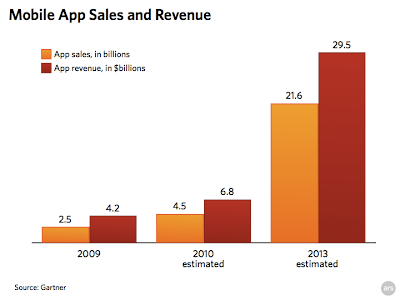As we all know and as was reinforced in spades by Monday's boffo earnings report... Apple has rapidly and radically revolutionized the mobile content industry with the iTunes App Store. In just 20 months the "fruit company from Cupertino" has created the mobile retail ecosystem that Nokia and the rest of us have been dreaming about since Y2k. There have been beneficiaries of the post-carrier app store revolution (besides Apple) in mobile gaming, which continues to be the biggest category. Notables include some great, small developers like Firemint, which has now sold 2mil copies of its Flight Control game and Lima Sky which is nearing that number with Doodle Jump. But, even some of the big players are claiming great success... Namco has just claimed 23mil App Store downloads, 3 weeks ago Gameloft claimed it had sold 10mil iPhone games and it's no secret that EA Mobile is the biggest App retailer of all. In many respects this should be the glory days of the mobile games space... so why is it then that many established publishers are suffering financially, and that some former luminaries might not survive 2010?
Here are some key factors in my opinion:
Content Clutter: Sure, the App Store is a great platform, but it's a cluttered mess, with over 140k Apps currently competing for the attention of iPhone and iPod touch customers. With very limited promotional real estate it's extremely difficult to create a breakout hit unless Apple has your back or a publisher has the marketing resources to fund substantial off channel promotion.
Price Erosion: As a corollary to the point above, the way many publishers are electing to compete is on price. While you'll see the occasional game as high as $9.99 inevitably the price begins to slip. Unless a game is exceptional, it's difficult to move product above $4.99 and as we all know many of the best sellers are 99¢. If you troll through the ratings comments you'll see that consumers increasingly believe that the price of a game on the platform should be 99¢. For quality publishers who traditionally spend 6-figures on game development (and licenses) that price point makes it exceptionally difficult to realize ROI.
The Carrier Channel's Diminished Importance: Although the majority of mobile game publisher revenues are still coming from carrier decks on Java/BREW feature phones, everybody knows that the consumers with the highest propensity to buy premium content, including games, are abandoning those platforms as quickly as they can get out of their contracts. This sea change is resulting in many publishers seeing 20% year-on-year declines in their Java/BREW revenues. Rapidly, the ability to push product through that klugy channel, by way of having strong relationships with key carrier personnel and having the ability to port games to hundreds of handsets, is shifting from being a competitive advantage, with strong barriers to entry, to being a relatively expensive liability.
Goodbye Recurring Subscriptions: It's a dirty, but poorly kept secret that lots of Java/BREW publishers adored the US carrier channels because of their embrace of the recurring subscription model. You know, buy the game for $9.99 or subscribe for $4.99 per month... which consumers think is such a deal 'til they realize (or don't), when they replace their handset in 15mos, that they spent $74.85 on a game they played 4 times. Publishers are seeing a whole lot less of this scenario, and it's associated lucre, as even the most gullible gamers move to smartphone platforms... where this model doesn't exist. Sure Apple has introduced in-game purchases, which facilitates the up-sell potential of virtual goods, etc. within Apps... but that relies on active decisions by purchasers and will only benefit those publishers that invest in making that a compelling proposition. The "sleeper" subscription model that benefited many game publishers for years is disappearing and those publishers that haven't factored that into their plans and found a way to compensate are going to have a rude awakening.
As a consequence of these factors, my feeling is that the greatest beneficiaries of the smartphone, app store revolution will be small, super-nimble, high-quality developers who elect to move up the value chain and publish to these more democratic platforms. I also believe that the very biggest publishers can survive the transition, and even flourish, by virtue of deep pockets, big brands, big marketing and close, trusted OEM relationships. The many publishers in-between are destined to be victims of this paradigm shift, I'm afraid, unless they learn to behave like their smaller competitors or consolidate into a bigger one.



















